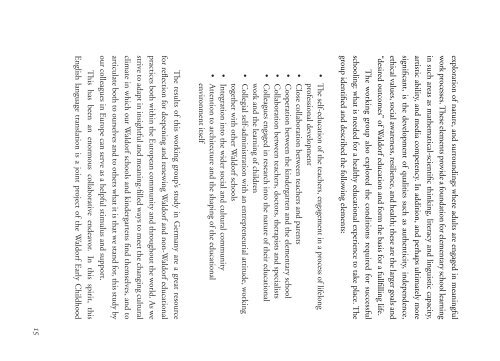Developmental Signatures - Waldorf Research Institute
Developmental Signatures - Waldorf Research Institute
Developmental Signatures - Waldorf Research Institute
You also want an ePaper? Increase the reach of your titles
YUMPU automatically turns print PDFs into web optimized ePapers that Google loves.
exploration of nature, and surroundings where adults are engaged in meaningful<br />
work processes. These elements provide a foundation for elementary school learning<br />
in such areas as mathematical-scientific thinking, literacy and linguistic capacity,<br />
artistic ability, and media competency. In addition, and perhaps ultimately more<br />
significant, is the development of qualities such as authenticity, independence,<br />
ethical values, social awareness, resilience, and health; these are the larger goals and<br />
“desired outcomes” of <strong>Waldorf</strong> education and form the basis for a fullfilling life.<br />
The working group also explored the conditions required for successful<br />
schooling: what is needed for a healthy educational experience to take place. The<br />
group identified and described the following elements:<br />
• The self-education of the teachers, engagement in a process of lifelong<br />
professional development<br />
• Close collaboration between teachers and parents<br />
• Cooperation between the kindergarten and the elementary school<br />
• Collaboration between teachers, doctors, therapists and specialists<br />
• Colleagues engaged in research into the nature of their educational<br />
work and the learning of children<br />
• Collegial self-administration with an entrepreneurial attitude, working<br />
together with other <strong>Waldorf</strong> schools<br />
• Integration into the wider social and cultural community<br />
• Attention to architecture and the shaping of the educational<br />
environment itself<br />
The results of this working group’s study in Germany are a great resource<br />
for reflection for deepening and renewing <strong>Waldorf</strong> and non-<strong>Waldorf</strong> educational<br />
practices both within the European community and throughout the world. As we<br />
strive to adapt in insightful and meaning-filled ways to meet the changing cultural<br />
climate in which our <strong>Waldorf</strong> schools and kindergartens find themselves, and to<br />
articulate both to ourselves and to others what it is that we stand for, this study by<br />
our colleagues in Europe can serve as a helpful stimulus and support.<br />
This has been an enormous collaborative endeavor. In this spirit, this<br />
English language translation is a joint project of the <strong>Waldorf</strong> Early Childhood
















